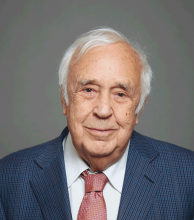You are here
The Faustian temptation
Dec 18,2021 - Last updated at Dec 18,2021
LONDON — In her dystopian 2003 novel “Oryx and Crake”, Margaret Atwood describes a pill called BlyssPluss that will make everyone happy and eliminate disease. But widespread use of the pill would hit pharmaceutical firms’ profits, so the companies pay HelthWyzer, a drug developer, to sicken users by inserting a virus into the pills. HelthWyzer can then double its profits by selling the antidote. “The best diseases, from a business point of view,” explains the scientist Crake, “would be those that cause lingering illnesses. Ideally — that is, for maximum profit — the patient should either get well or die just before all of his or her money runs out. It’s a fine calculation”.
Crake’s “ideal” illness, therefore, is one that stimulates the production and sale of antidotes. A regrettable consequence of this shrewd business plan is that most of the world’s population dies.
The provocative thought here is deliberately willing the bad to produce the good. This is akin to the noted development economist Albert O. Hirschman’s idea of “optimal” crises — deep enough to trigger progress, but not so deep that they wipe out the means of achieving it. Hirschman himself supported projects he thought likely to fail, in order to create “pressure points” for improvement.
All of this leads one to wonder about the meaning of the extreme events that many predict will occur in the coming century as a result of climate change — and, of course, about the significance of the more traditional plagues and famines likely to afflict us.
The source of this speculation is theological as well as prosaic: Why, if God is omnipotent and perfectly good, did he create a world with suffering and evil? One answer, according to Stephen Davies in his 2019 book “The Street-Wise Guide to the Devil and His Works”, is that Satan is placed in God’s creation “to test and examine the faith and virtue [...] of humanity.” Another is that “evil is necessary to perfect the good.” The Devil is thus a “hostile power who brings out and makes possible a stronger and fuller kind of good”.
Satan’s role in Christian theodicy is therefore to bring about bad events to provoke a necessary response. The Devil plays this part in both Milton’s “Paradise Lost” and Shelley’s “Prometheus Unbound”. The economist Joseph Schumpeter expressed the same idea with his theory that economies progress through “creative destruction”.
But the ultimate expression of this idea is Goethe’s “Faust”. In the opening “Prologue in Heaven”, God explains his problem to the demon Mephistopheles. Humanity, made in God’s image, has the potential for progress but is naturally lazy and incurious: “It’s so easy for men to slump and before long they want to do nothing at all.” God sends Mephistopheles to rouse them from their complacency, as the force that “would do evil evermore, and yet create the good”.
Will this, then, be the point of the extreme climate events that will likely befall us? After all, few now honestly believe either that the world will meet the targets set at the recent United Nations Climate Change Conference (COP26), or, even if it does, that we will limit overall global warming to 1.5ºC above preindustrial levels.
In his recent book “Decarbonomics & the Post-Pandemic World”, the economist Charles Dumas projects a sequence of extreme events associated with rising temperatures. If global warming stabilises at 1.5ºC by 2025, we can expect faster desertification in North America and Africa, the slowing or ceasing of the Gulf Stream by 2100, the disappearance of mountain glaciers and parts of the Arctic, rainforest losses, and unprecedented hurricanes in the South Atlantic, submerging islands.
In a second scenario, the increase in global temperature exceeds 1.5ºC. As a result, the Gobi Desert expands, shellfish are wiped out, and the Mediterranean becomes arid, with forest fires raging continually. In addition, Miami, central London, much of Manhattan, Shanghai, Mumbai and Bangkok are under water by the middle of the twenty-second century, wars for control of the newly liquid Arctic erupt, the Andean ice melt dries up Peru, and many species die.
Dumas’s third scenario is even more extreme. Much of southern Africa and the Amazon basin become desert, Northern India and Pakistan are hit by a Himalayan snowmelt, and storms rage constantly. Rising sea levels drown New York, London, the Netherlands, and Australian cities, and tropical diseases much more dangerous than COVID-19 spread rapidly. Dumas makes no further projections, because the damage caused in the first three scenarios will “make it highly likely that drastic measures will be accepted and taken.”
Such catastrophic events need not be divine judgment to serve as necessary wake-up calls. Whereas Enlightenment thinkers had faith in the linear progress of the human mind, attaining higher states of thinking and behavior may in fact depend in part on extreme events. History provides abundant support for this view: World War II, for example, was a necessary precondition for the establishment of the European Union.
But this is a far cry from saying that we should deliberately will evil in order to achieve good, as the drug companies thought they were doing in Atwood’s novel. For one thing, it is impossible to calibrate “optimal” crises.
Moreover, we are less disposed today to agree with Robespierre that terror is justified if it leads to virtue, because the theory of the “necessary price” of progress fell afoul of the atrocities of Stalinism and Hitlerism. “We encountered situations”, the German philosopher Karl Jaspers wrote in 1948, “in which we had no inclination to read Goethe, but turned instead to Shakespeare, Aeschylus, or the Bible, if indeed we could still read at all”.
But Faust nonetheless remains the elephant in the room, the uninvited guest of modernity.
Robert Skidelsky, a member of the British House of Lords, is professor emeritus of Political Economy at Warwick University. The author of a three-volume biography of John Maynard Keynes, he began his political career in the Labour Party, became the Conservative Party’s spokesman for Treasury affairs in the House of Lords, and was eventually forced out of the Conservative Party for his opposition to NATO’s intervention in Kosovo in 1999.










